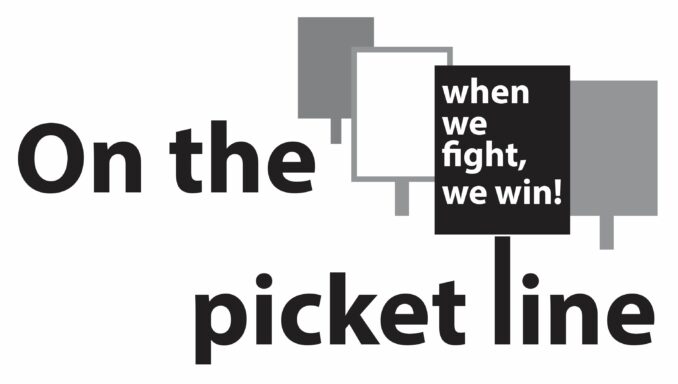On the picket line

UAW strikes Iowa wheel plant
United Auto Workers members at the Thombert plant in Newton, Iowa, have been on strike since August 1. Thombert is one of the world’s largest manufacturers of polyurethane wheels and tires for narrow aisle lift trucks. Contract negotiations with Thombert bosses broke down after 90% of members voted “no” on the latest company offer, which would have reduced accident and sickness benefits and did not offer an acceptable pay increase.
The 87 striking workers are receiving support and solidarity from nearby UAW locals. UAW International President Shawn Fain posted this message the day the strike began: “Just this afternoon, our members who make forklift wheels and tires at Thombert in Newton, Iowa, went on strike. They’re members of Local 997, Unit 8. All of us understand the issues they are striking for: fair wages so they can support their families, vacation time so they can be with their families, short-term disability benefits and shift rotations that every factory worker deserves.” (uaw.org)
The strike at the Iowa plant is happening as 150,000 UAW members prepare for their contract showdown with the Big 3 auto companies next month.
New York City’s first pizza shop union
Workers at Barboncino Pizzeria won an election, supervised by the National Labor Relations Board (NLRB), to be represented by Barboncino Workers United. The bosses had refused to voluntarily recognize their union.
The union pizza shop is the first of its kind in New York City. Union supporters said conditions began to deteriorate when the shop was sold in late 2022, and the new bosses refused to consider requests or demands on petitions for increased wages, changes to termination policies and a say on how sexual harassment is addressed.
The pizzeria staff were aided in their organizing efforts by Workers United, with which they are now affiliated. The new union is demanding better wages, more control over scheduling, transparency in discipline procedures and a zero tolerance of sexual harassment.
Barboncino Workers United is in solidarity with other food service workers in an industry that is historically considered difficult to organize due to high turnover. However, that looks to be changing given the recent successful campaigns to organize Starbucks and other fast-food restaurants, microbreweries and coffee shops.
In a 2019 interview, Saru Jayaraman, president and cofounder of the restaurant worker advocacy group Restaurant Opportunities Centers United, explained, “High levels of inequality, the mortgage crisis, increased profiles of sexual harassment and racial discrimination — all are creating the ability for workers to stand up.” (tinyurl.com/32ph7729)
Conditions for food service workers have only gotten worse since then with increased attacks on Black and Brown workers and the LGBTQ2S+ community, not to mention the hardship of surviving through the pandemic when little is being done to protect workers from unreasonable demands and poor compensation from the bosses.
LGBTQ+ dating app workers unionize
At Grindr, the world’s biggest LGBTQ+ dating app, an overwhelming majority of workers have signed cards to be represented by Communications Workers of America and have petitioned the NLRB for an election. The union drive gained momentum when workers discovered that the new Grindr CEO, George Arison, supported and even made campaign donations to anti-LGBTQ2S+ political candidates! The workers want job protections, given the recent layoff trend in the tech industry, along with guarantees that they may continue to work remotely and will receive severance pay — which the new CEO contract already has — if they lose their jobs. They also want a representative on Grindr’s board of directors.
Union member Jack Alto summed up the special cultural significance that the workers are striving to achieve through their union organizing efforts: “We’d like to keep the great company culture we have now, which is a little silly; we have a queer sense of humor. We’re also fiercely protective of our users and community. We’d love to have more equity and intersectionality, reflecting the world of our users. We have so many users who speak Spanish. We want to reflect users who have disabilities and make sure it’s not only a legal requirement to make the app accessible for them. More importantly, it’s the moral and just requirement to make it accessible for them.” (Jacobin, July 29)
Grindr workers recently filed charges with the NLRB against the company for retaliatory tactics like forcing workers back to the office, requiring many to move to Los Angeles, Chicago or the Bay Area as assigned. (@GrindrUnited, Twitter)

